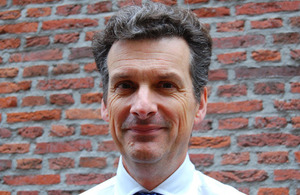Sir Geoffrey Adams at the OPCW
British Ambassador Sir Geoffrey Adams delivered the UK's national statement at the 38th meeting of the Executive Council of the OPCW

Speaking at the 38th meeting of the Executive Council of the Organisation for the Prohibition of Chemical Weapons (OPCW), Sir Geoffrey Adams said:
Mr Chairman,
May I underline the United Kingdom’s gratitude for the continuing excellent work of the OPCW and the Joint Mission in coordinating what is a genuine example of international co-operation and burden sharing.
As the DG has said, a great deal has already been achieved. However, the United Kingdom is increasingly concerned that the removal of Priority one material from Syria is being delayed. The deadline for completion of this activity was 31 December, and despite a second shipment taking place earlier this week, it is still only a very small volume of material that has been removed. Continuing at this pace would mean that the removal process could take years. The removal of Priority two material is due for completion by 5 February - only a week away - and clearly that deadline will not be met either.
Syria has explained some of the reasons for the delay in moving material. Some, such as the impact of weather, were understandable. But the growing list of equipment seems to be more of an excuse than a reason, as movement of the stockpile was possible without these supplies in previous years.
We note in particular the OPCW-UN Joint Mission assessment, reported by the UN Secretary General on 27 January, that Syria now has “sufficient material and equipment to carry out multiple ground movements to ensure the expeditious removal” of the remaining chemicals. While we agree that all material must be destroyed safely and methodically, the international community has done its part to ensure this. So the time for excuses is over: we now need action. Syria must, without further delay, transport the remainder of the chemicals to Latakia for removal.
These delays, as well as calling into question Syria’s commitment to deadlines which it agreed, also have practical implications. For example both civilian and military vessels have been diverted from their regular duties, which cannot continue indefinitely. Delays are also adding to the complexity for both the OPCW and States Parties in making contractual arrangements for the destruction of the chemicals. The willingness of the international community to underwrite the destruction costs of this operation – which should rightly fall to the Possessor State under the Convention – is not without limits.
So, we urge this Council to send Syria a message by agreeing language in our report expressing our growing concern and the need for urgent action by Syria so that the next deadlines can be met.
Finally, Mr Chairman,
The UK is also concerned about the lack of progress in agreeing a destruction plan for Syria’s former chemical weapon production facilities. This Council did not agree to a Syrian request to convert 12 of their 18 former production facilities but it did agree to give time for technical consultations on how best to achieve their destruction. So far these consultations have not borne fruit. But what is clear from the Convention is that these sites need to be “physically destroyedi” to meet the principles set out in the Verification Annex. This is the standard which other Possessor States have been required to meet, and Syria is no different. We cannot accept something less which achieves only their “inactivation”.
I request that this statement be issued as an official document of this Council meeting.